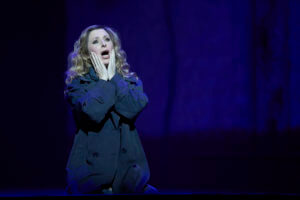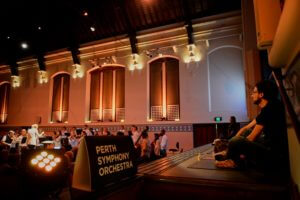Perth Concert Hall
reviewed by Neville Cohn.
Cedric Tiberghien is a highly accomplished pianist. I recall with please his stunningly fine accounts of some of Messiaen’s most complex works at a Perth Festival some years ago. His flawless fingers are up to any challenge – and this was again very much the case in Rachmaninov’s Piano Concerto No 3. Only the most skilled of musicians would dare essay a work such as this in public. It’s a closed book to any but top-end virtuosos. Throughout, in purely physical terms, Tiberghien could not be faulted – but on this occasion, the presentation as a whole was something of a disappointment: the raging demon that lurks behind the printed note was here only fitfully apparent. And another distraction was the late arrival (just as the slow movement commenced) of numbers of late-comers. Swarming in as they headed for seats, often mid-row, there was much standing-up and sitting down by patrons already seated. All this demolished the gentle atmosphere of the concerto’s exquisite adagio. In the ferociously difficult finale, Tiberghien was at his thrilling, virtuosic best but again, taking up an interpretative position some distance from the emotional epicentre of the music. Throughout, Fisch took the WASO through an impeccable, finely supportive accompaniment.
There was an encore: Bach’s Prelude No 1 in C from Book 1 of Bach’s famous ”48”: it was a marvellous moment: a little miracle of gentle beauty.
Bartok’s music for orchestra can be, and often is, very challenging and tricky to bring off successfully. And that was certainly the case as Fisch took his players through the rhythmically complex Dance Suite to emerge from the maze with honour intact. Bassoon, trombone and tuba were much to the fore in the opening pages – and flutes were frankly delightful. And in the second movement, robust brass conjured up images of rough peasants energetically stamping away. Abrasive, jubilant, ear-grating and glowering were adjectives that came to mind as Fisch and the WASO steered a splendid way through the suite. Bravo!





 What would most office workers do when it’s time to leave for the day? I imagine some might head for a drink at the nearest watering hole or perhaps do some hurried shopping for dinner before walking to a train station, bus stop or parking garage to head home. But the people who run Perth Symphony Orchestra came up with another possibility: offering city workers the chance to listen to a symphony concert before going home – and getting a little handy advice on yoga relaxation techniques for good measure.
What would most office workers do when it’s time to leave for the day? I imagine some might head for a drink at the nearest watering hole or perhaps do some hurried shopping for dinner before walking to a train station, bus stop or parking garage to head home. But the people who run Perth Symphony Orchestra came up with another possibility: offering city workers the chance to listen to a symphony concert before going home – and getting a little handy advice on yoga relaxation techniques for good measure. As was customary in Mozart’s day, the orchestra played standing (other than the cellists, of course). Audience seating was arranged around the orchestra, the players casually garbed in blue jeans and white tops. And from first note to last, there was about the playing a disciplined commitment which augurs well. Laurels, in particular, to the cellists and flautist; their contribution was particularly pleasing. The same could be said of the horn and trumpet players who were much on their mettle.
As was customary in Mozart’s day, the orchestra played standing (other than the cellists, of course). Audience seating was arranged around the orchestra, the players casually garbed in blue jeans and white tops. And from first note to last, there was about the playing a disciplined commitment which augurs well. Laurels, in particular, to the cellists and flautist; their contribution was particularly pleasing. The same could be said of the horn and trumpet players who were much on their mettle. He was a horrible person. He treated women appallingly. His vanity was exceeded only by his vanity. He was ferociously anti-semitic – but never hesitated to appoint top-flight Jews to interpret his music when he needed them. So he was a hypocrite as well. Wagner also engaged in the German revolution of 1848-1849). He took part in the Dresden uprising and had to flee the country when a warrant for his arrest was issued. But he was, as well, a genius, a composer of unique and profound operas. And this was breathtakingly in evidence at the Concert Hall on Sunday when Asher Fisch presided over an account of Tristan and Isolde, presented in concert version.
He was a horrible person. He treated women appallingly. His vanity was exceeded only by his vanity. He was ferociously anti-semitic – but never hesitated to appoint top-flight Jews to interpret his music when he needed them. So he was a hypocrite as well. Wagner also engaged in the German revolution of 1848-1849). He took part in the Dresden uprising and had to flee the country when a warrant for his arrest was issued. But he was, as well, a genius, a composer of unique and profound operas. And this was breathtakingly in evidence at the Concert Hall on Sunday when Asher Fisch presided over an account of Tristan and Isolde, presented in concert version.